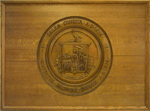Leslie's retreat: Difference between revisions
No edit summary |
No edit summary |
||
| Line 24: | Line 24: | ||
*[http://evergreen.noblenet.org/eg/opac/record/2058815?locg=63 Celebration at North Bridge; July 4, 1862] George B. Loring | *[http://evergreen.noblenet.org/eg/opac/record/2058815?locg=63 Celebration at North Bridge; July 4, 1862] George B. Loring | ||
*[http://salem.noblenet.org/eg/opac/record/3541078?locg=63 Prelude to revolution; the Salem gunpowder raid of 1775] P.C. Hoffer | |||
*[https://streetsofsalem.com/2014/02/26/resistance-and-retreat-in-salem-1775/ Resistance and retreat in Salem 1775] Streets of Salem blog | *[https://streetsofsalem.com/2014/02/26/resistance-and-retreat-in-salem-1775/ Resistance and retreat in Salem 1775] Streets of Salem blog | ||
Revision as of 10:19, 2 March 2017
On Feb. 26, 1775, the first armed resistance by the colonies to British authority occurred at North Bridge in Salem. When reports that a cannon and ammunition had been hidden in North Fields, (now North Salem) General Gage sent Colonel Leslie and 300 British soldiers from Boston to Marblehead by ship. The citizens of Salem had been forewarned of the approaching British forces gathered at the North Bridge and raised the draw. What might have been the first battle of the Revolutionary War was averted because of a compromise that was made by Colonel Timothy Pickering and Colonel David Mason of the local militia and Colonel Leslie. Rev. Thomas Barnard of the North Church helped bring about the compromise. The draw was lowered and Colonel Leslie and his men marched a short distance beyond, turned and headed back to Marblehead. The British soldiers under Leslie numbered approximately 140. American soldiers under Pickering numbered approximately 50.
See Also
- Vertical File in Salem Collection - Leslie's Retreat
- Old Naumkeag by C.H. Webber, p.176-177.
- Historical sketch of Salem by Charles S. Osgood, p. 47-
- Salem in the Eighteenth Century by James Duncan Phillips, p. 352-360.
- First Armed Resistance (Leslie's Retreat) Historical Marker Historical Marker Database
- "Park may be named for patriot's first stand" Salem Evening News, April 11, 2002 , p.A2
- Hidden History of Salem S. Saville p.18-26
- Celebration at North Bridge; July 4, 1862 George B. Loring
- Resistance and retreat in Salem 1775 Streets of Salem blog
- Re-engaging with Leslie's Retreat Streets of Salem blog
